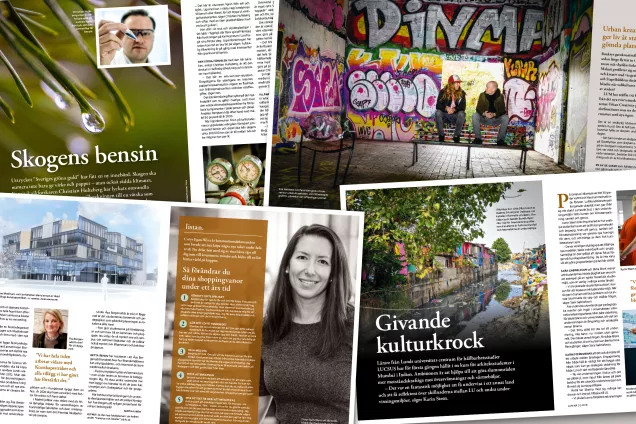Are people generally trustworthy? Yes, say about two out of three Swedes. Nordic countries are ranked high in what we call interpersonal trust. In other countries, trust is not as obvious. What happens when these perspectives meet? Economist Andreas Bergh has studied the phenomenon more closely.
In Sweden, we have access to healthcare and education regardless of what our parents earn, we are judged by a judicial system in which everyone is considered equal in the eyes of the law, and we dare to ask strangers on the train to keep an eye on our luggage while we go get a cup of coffee. We trust the people around us.
Andreas Bergh, a researcher at Lund University’s School of Economics and Management, has been interested in the phenomenon of trust ever since he wrote his doctoral thesis 15 years ago about the Swedish welfare state, wanting to find out why some countries are welfare states and others are not.
“The way you answer the question ‘Are people generally trustworthy?’ usually correlates with how you behave in various situations. People who feel trust have certain personal, political and financial benefits. Trusting people have better health and higher income, they experience more life satisfaction, and are more inclined to cooperate”, says Andreas Bergh.
In its confidence surveys, Eurostat, which compiles and reports official statistics for the EU, notes that trust is high in the Nordic countries, while in Turkey, South America and the former Soviet states, for example, there is little trust. In countries with a lot of trust, people have both higher education and higher income.
“High trust has been shown to promote economic growth. Doing the right things and not having to spend time on control mechanisms increases productivity and lowers transaction costs. With trust and reliability, fewer resources can be spent on making sure that agreements are kept, and more agreements can be reached. Shopkeepers are able to hang their garments on racks outside the store. If you trust people, there is no need to involve lawyers, legal counsels, police officers, the judicial system – the agreements are nevertheless kept.
But what happens when groups with different levels of interpersonal trust meet? What happens to trusting Swedes who move abroad – and when we receive people from countries in which trust and welfare are low?
Swedish trust has remained unchanged for a very long time.
“When asked, people generally believe that trust has diminished in recent years on account of the influx of refugees. But trust is something that is passed down for generations. It is very robust.”
According to Andreas Bergh, in Swedish communities in the United States, the belief that people are generally trustworthy is ten per cent higher. But at the same time, other surveys show that certain adaptations take place when moving from a low-trust country to a high-trust country.
“42 per cent of the people who moved to Sweden from Serbia and Montenegro find that people are generally trustworthy, compared to 26 per cent among those who remained. Among Turks living in Denmark, the figure is 31 per cent – and as low as 16 per cent in Turkey.”
“But it’s still quite far from the Danes at 68 per cent.”
In ethnically homogeneous areas which are common in the United States – such as Chinatown and Little Italy – trust seems to be higher than in ethnically mixed areas.
It seems that welfare comes after trust, not the other way around. One hypothesis that has received some support is that trust increases if people feel that the constitutional state operates as it should – impartial and without corruption.
“It shouldn’t be possible to bribe your way out or influence by knowing the right person.”
Another hypothesis is that competition promotes trust.
“Say, for instance, that a seller has tricked you into buying a faulty product – if there is competition, the trickster will be driven out of business”, says Andreas Bergh, noting that former communist regimes usually have lower levels of trust.
He stresses that we should think about Sweden’s reception of immigrants – how does it affect their trust?
“There is reason to review the establishment process – a vulnerable situation that can be perceived as legally uncertain. Furthermore, young people seem to be more susceptible to building trust, and deficiencies in the rule of law risk damaging that trust. Although it doesn’t show in the statistics immediately, the damage can be difficult to repair at a later stage.”
EVELINA LINDÉN
Facts:
Andreas Bergh is an economist and associate professor at Lund University’s School of Economics and Management. He recently released his new book “Två filter – varför du har fel om nästan allt, men ändå inte vill ändra dig” (Two filters – why you are wrong about practically everything, yet you refuse to change), published within the series Liberal Idédebatt.
In addition to Eurostat, trust is measured by the SOM Institute in Gothenburg and in surveys such as the European Value Survey and the World Value Survey.
High-trust countries are characterised by low income inequality, a functioning rule of law, low corruption, a high level of education, meritocracy.




